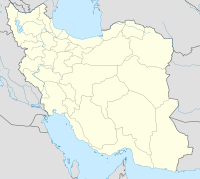Tomb of Darius I
| Tomb of Darius the Great | |
|---|---|

View of Tomb of Darius the Great in Naqsh-e Rustam
|
|
| Basic information | |
| Location |
|
| Sector | Naqsh-e Rustam |
| Municipality | Marvdasht |
| Territory | Iran |
| State | Marvdasht |
| Province | Fars province |
| Region | Iran |
| Architectural style | Achaemenid |
| Materials | Stone |
| Naqsh-e Rustam | |
|---|---|
| Location in Iran | |
| Coordinates: 29°59′20″N 52°52′29″E / 29.98889°N 52.87472°E |
Coordinates: 29°59′20″N 52°52′29″E / 29.98889°N 52.87472°E
The tomb of Darius I (Darius the Great) is one of the four tombs of Achaemenid kings at the historical site of Naqsh-e Rustam located about 12 km northwest of Persepolis, Iran. They are all at a considerable height above the ground. One of the tombs is explicitly identified by an accompanying inscription to be the tomb of Darius I (c. 522–486 BC). The other three tombs are believed to be those of Xerxes I (c. 486–465 BC), Artaxerxes I (c. 465–424 BC), and Darius II (c. 423–404 BC). The fifth tomb, (incomplete) might be that of Artaxerxes III, who reigned at the longest two years, but is more likely belonged to the last Achaemenid king, Darius III (c. 336–330 BC). The tombs were looted following the conquest of the Achaemenid empire by Alexander the Great.
...
Wikipedia

